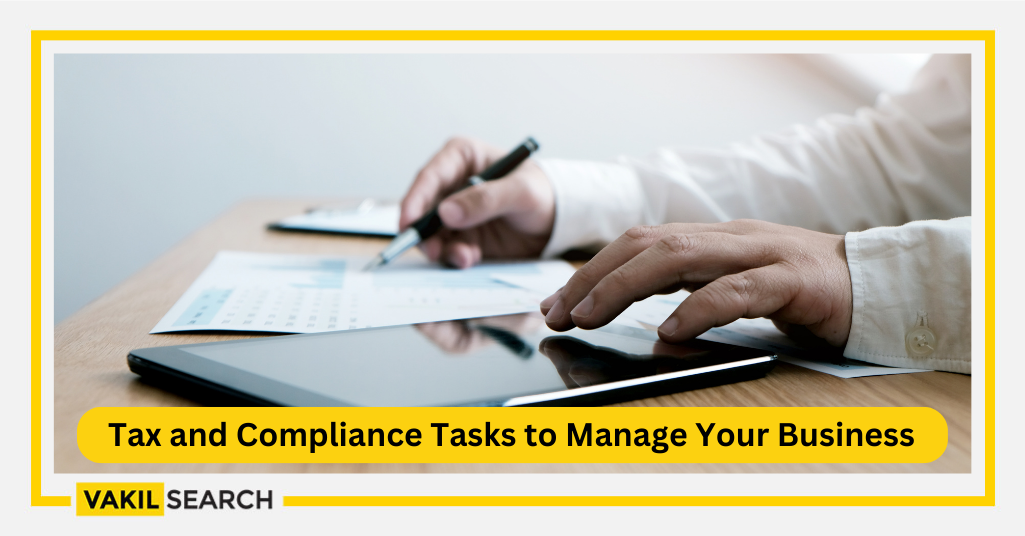If you are an entrepreneur, you must have realised by now that it’s not easy being one. To make it less difficult for you, we've compiled a list of critical tax and compliance tasks that you can't afford to miss, ignore, or neglect.
People might think running a business is a ‘cakewalk’. Only you, as an entrepreneur, would know the amount of hard work you need to put in to manage a business, day in and day out. You need to be on top of numerous strategies related to customer acquisition, competition handling, customer support, and whatnot! Amidst all these, it’s quite normal for you to overlook another important aspect related to managing your business – the tax and compliance part. While we perfectly understand what makes you overlook this part of your business; let us also tell you that you may find yourself in troubled waters, if you do not ‘streamline’ this important part.
This is the reason why we have listed certain important tax and compliance tasks that you just can’t afford to miss, ignore, or overlook at any cost. Go through this blog and we are sure you will thank us later!
Here we go!
A) GST Registration and GST Return Filings
The Goods and Service Tax (GST) is a destination-based indirect tax. If you provide any service or sell goods and have an annual turnover of over ₹40 lakhs (₹20 lakhs for certain special category states), you must register with GST. This will enable you to charge GST on your products/services. Depending upon the business you operate, you need to file different GST returns periodically (monthly, quarterly, and annually), on or before the respective deadlines. As per the prevailing rules, the following entities should mandatorily register with GST:
- Individuals/businesses registered under the tax services in the pre-GST regime (VAT, excise, service tax, etc.)
- Non-resident taxable person
- Inter-state suppliers of goods & services
- Persons needed to deduct TDS and TCS under GST
- A person/business that supplies online information, database access, and/or retrieval services from outside the country to a person/business in India
- Casual taxable person
- A person/business that supplies items through an e-commerce aggregator
- Input service distributors
- Persons selling on behalf of someone else, either as a principal or as an agent
- All e-commerce aggregators that facilitate supply through their platform
- Any other person/business as notified by the central government and/or state government.
B) Filing Business Tax Returns
If you are running a business, you are doing so to earn a profit or income. It’s simple! This is what makes you liable to file income tax returns for your business. In the tax return, you need to show all your business’s income in the assessment period and pay tax on it. Also, every business needs to pay advance tax quarterly. You must make it a habit to pay all your taxes on time and File TDS Returns before the deadline.
C) Filing ROC Returns
Every company registered under the Companies Act of 2013 (or Companies Act, 1956) needs to file annual returns with the RoC (Registrar of Companies). The RoC requires these files to examine the company’s financial status. As a part of the annual compliance, you need to file the following forms mandatorily:
- Form 23 AC: Here, you need to include details of the company balance sheet and file with the RoC within 30 days of conducting the board meeting
- Form 20B OR Form 21A: These are annual return forms and must be filed in electronic mode with the RoC within 30 days of holding the AGM (annual general meeting)
- Form 66: You need to file a compliance certificate in Form 66 if your annual paid-up share capital is in the range of ₹10 lakhs – ₹50 crores.
Simplify your business set up costs with our startup cost calculator. Get precise estimates for your new venture!
D) Filing TDS Returns
A business needs to make different types of payments such as employee salaries, consultant fees or payment for any work done for the business, etc. When your business makes any such payments to any party, it is done after deducting the applicable TDS (tax deducted at source) on the amount. You need to deposit the deducted TDS with the government periodically. You should file TDS returns timely to reflect the TDS collected and deposited by your business.
E) Maintaining Books of Accounts
Your business needs to maintain proper books of accounts. An efficient and updated bookkeeping system enables the business to retrieve information regarding its transactions easily. It also provides a clear picture of the organization to all its stakeholders and investors. Therefore, whether you are a growing business, startup, or mature corporation, you need to be on top of your internal bookkeeping systems, all the time.
Conclusion
The above are some of the most important tax and compliance tasks a business can’t afford to ignore. Hope you complete all these on time and stay on the right side of regulations. If you need assistance or expert advice on handling your tax and compliance obligations, please contact Vakilsearch. We have a team of legal specialists and lawyers who can assist you in efficiently managing and planning your taxes. Vakilsearch also offers a variety of tax management, GST advisory, and tax compliance services. So, what are you holding out for? Team up with us to ensure that your business is always on the right side of the law!





